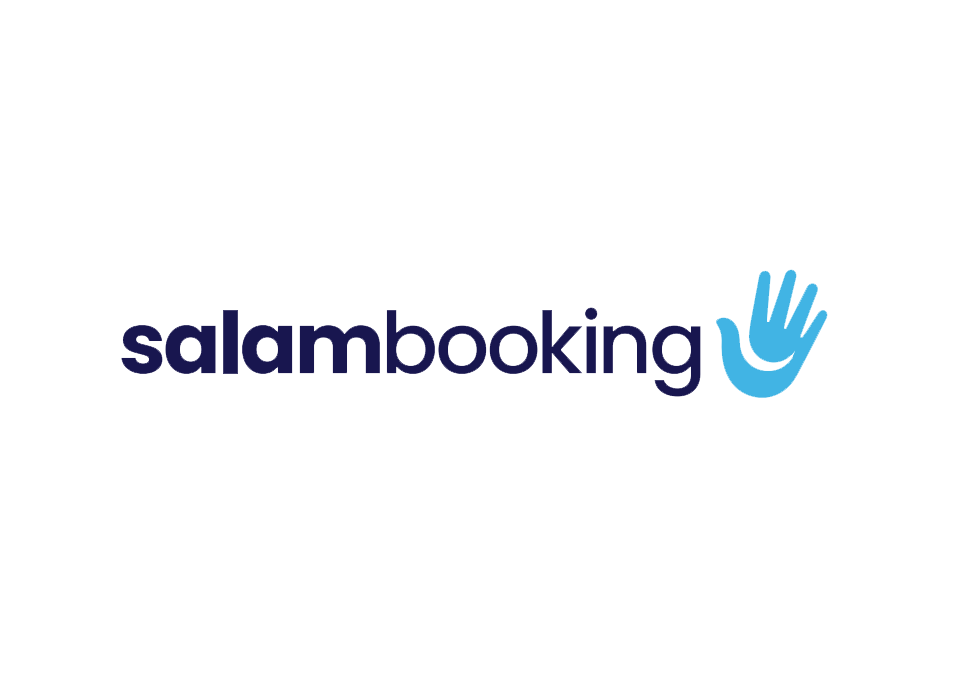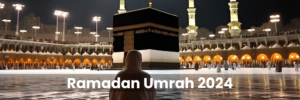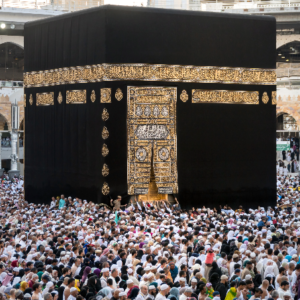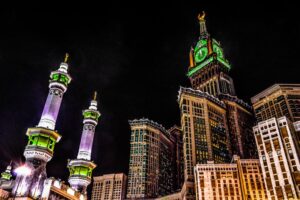Morocco
Discover a rich history, diverse culture, and stunning natural beauty in halal friendly Morocco.
From the bustling city of Marrakech to the peaceful Atlas Mountains, Morocco has something to offer every type of traveller. As a predominantly Muslim country, it is also a must-visit destination for Muslim travellers looking to immerse themselves in a unique blend of traditional and modern culture. One of the main attractions of Morocco is its lively and colourful cities. Marrakech, in particular, is famous for its bustling souks (markets), stunning architecture, and vibrant heritage. The city is also home to numerous historical landmarks, including the Koutoubia Mosque and the Saadian Tombs, both of which offer a glimpse into Morocco’s history.
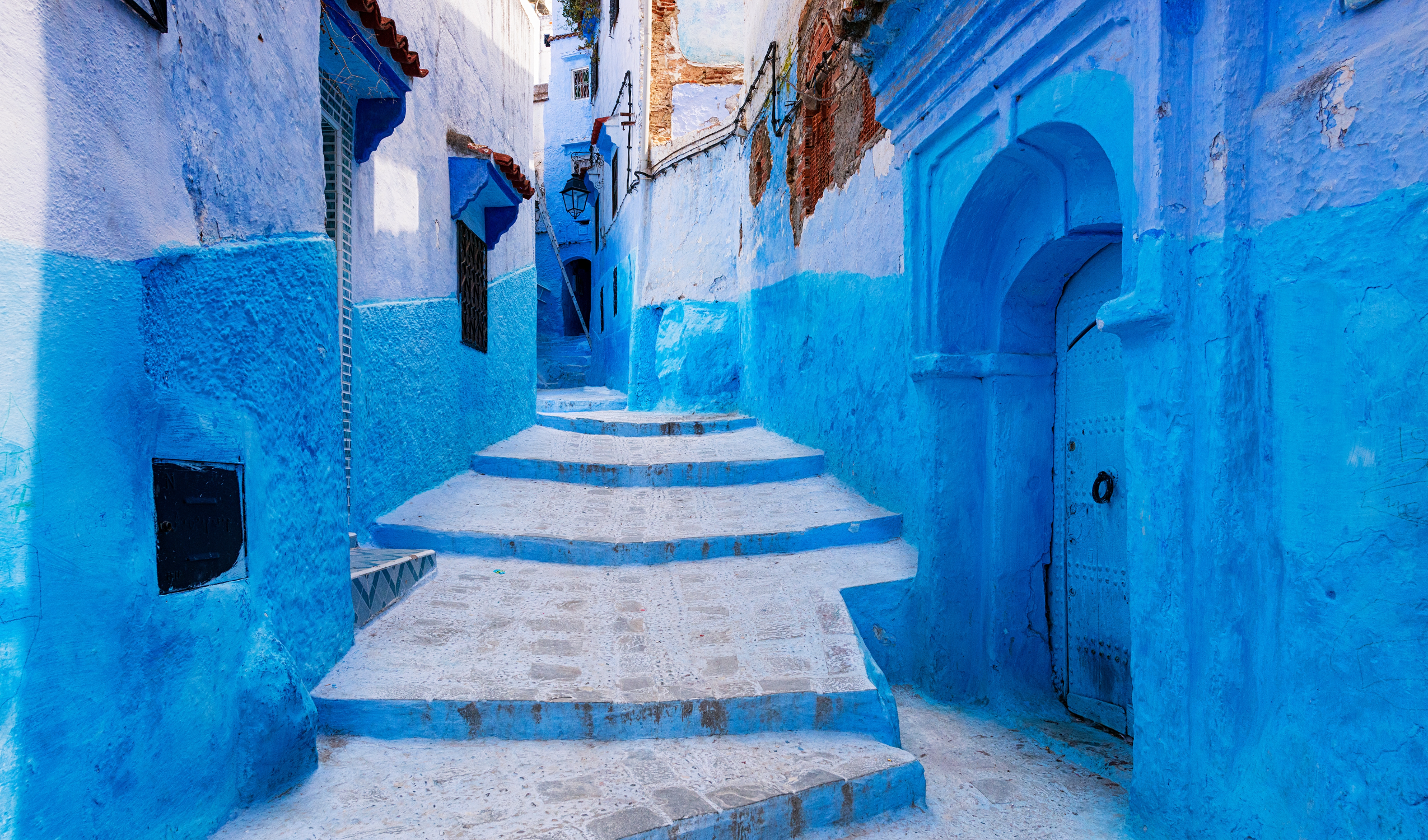
For those looking to escape the hustle and bustle of the city, Morocco’s natural beauty is unmatched. Those travelling for their halal honeymoon will enjoy exploring the rugged coastline of the Atlantic Ocean and the snow-capped peaks of the Atlas Mountains. For the adventurous traveller, the Toubkal National Park, located in the Atlas Mountains, is particularly popular among hikers and trekkers and offers breathtaking views not many get to see. Whether you’re travelling solo, as a couple, or in a group of family and friends, visitors will undoubtedly enjoy visiting this beautiful destination.
Morocco is also known for its traditional and unique halal cuisine, which is heavily influenced by its location at the crossroads of Europe, Africa, and the Middle East. From tagines and couscous to mint tea and fresh bread, the food in Morocco is both flavorful and filling and well worth a try. For Muslim travellers, Morocco is a particularly attractive destination due to its strong Islamic culture and heritage. Mosques and Islamic schools are found throughout the country, and the call to prayer can be heard echoing through the streets several times a day. Whether you’re interested in exploring its cities, experiencing its traditional culture, or simply taking in its breathtaking landscapes, Morocco is a destination that should not be missed.
Must See in Morocco
Morocco attracts millions of tourists every year who come to experience the vibrant cities, charming villages, and breathtaking landscapes that halal friendly Morocco has to offer. If Morocco is on your bucket list, then check out these must-sees for Muslim travellers visiting the country.
Visit The Hassan II Mosque: A religious and cultural landmark located in Casablanca, Morocco, the Hassan II Mosque is the largest mosque in Morocco and one of the largest in the world, with a capacity for over 25,000 worshippers. The mosque was completed in 1993 and features a distinctive modern design with intricate traditional details, including a towering minaret that rises over 200 meters into the sky. The mosque is also known for its extensive use of traditional Moroccan craftsmanship, including intricate woodwork, stonework, and tilework. It is a popular tourist attraction and an important symbol of Morocco’s Islamic heritage.
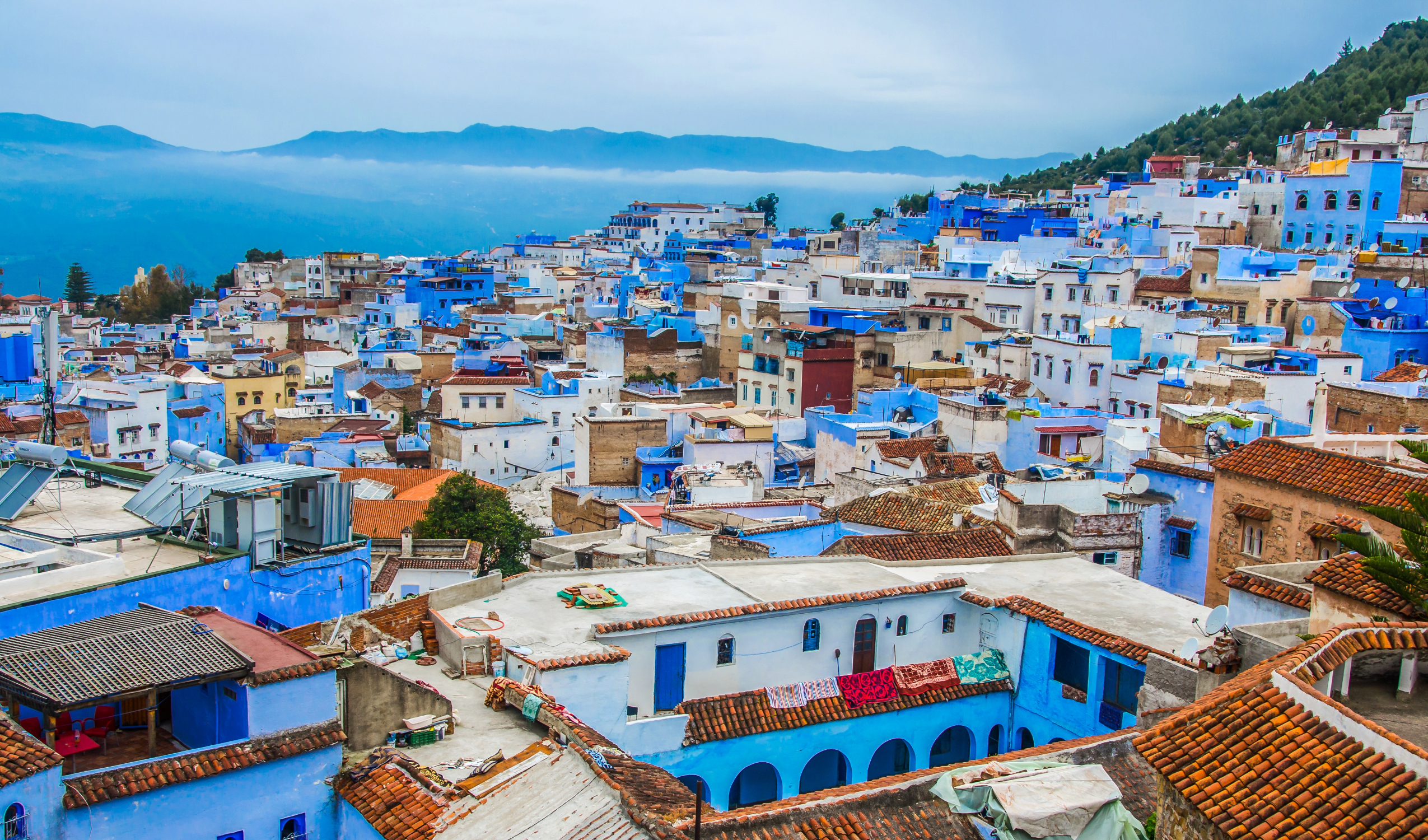
Explore Fes and Al Quarawiyine University: An ancient city that is a must-visit for tourists travelling to Morocco is Fes. This city is considered the cultural and spiritual heart of Morocco and is home to some of the country’s most important historical sites. One of these is the Al Quaraouiyine Mosque and University. Also known as Al-Karaouine, the Al Quarawiyine University is one of the oldest universities in the world, founded in 859. It has played a key role in the development of Muslim and Arabic education and has produced many prominent scholars. Today, it offers a wide range of academic programs and continues to be a centre of learning and culture in Morocco and the region. The city’s famous souks are also not to be missed, where visitors can experience the sights, sounds, and smells of traditional Moroccan life.
Tour Marrakesh and Koutoubia Mosque: Another ancient city is one of Morocco’s most popular tourist destinations, and it’s easy to see why. Marrakesh is known for its bustling markets, stunning palaces, and vibrant gardens. The city’s most famous attraction is the Djemaa el-Fna, a square in the heart of the city filled with street performers, food stalls, and colourful spices. It’s also in Marrakesh where you’ll find the Kutubiyya Mosque or Koutoubia Mosque. Built in the 12th century, the mosque is known for its distinctive minaret, which is considered one of the most elegant in Morocco. The mosque is surrounded by lush gardens and is a popular tourist attraction as it reflects the city’s rich history and cultural heritage.
Escape to the Sahara Desert: No visit to Morocco would be complete without a trip to the Sahara Desert. The vast expanse of sand dunes is one of the country’s most iconic landscapes, and visitors can take a camel trek, stay in a traditional desert camp, or simply soak up the breathtaking views.
Stunning views at the Atlas Mountains: For those who want to experience Morocco’s stunning natural beauty, the Atlas Mountains are a must-visit. This majestic range offers breathtaking views of the surrounding countryside, and visitors can hike, go rock climbing, or simply relax and take in the scenery. The Berber villages scattered throughout the mountains offer a unique glimpse into traditional Moroccan life, and visitors can learn about the local culture, visit ancient kasbahs, and sample the delicious local cuisine.
Bonus attraction!
Be mesmerized by Chefchaouen: This charming mountain town is famous for its blue-painted buildings, making it one of the most picturesque destinations in Morocco. The town is a peaceful and serene escape from the busy cities, and visitors can explore the winding streets, shop for local crafts, or simply relax and take in the stunning views.
Cuisine
Halal cuisine is a staple in Morocco and is an important aspect of the country’s rich cultural heritage. Morocco has a large Muslim population and as such, the country has a thriving food culture that emphasizes the use of fresh ingredients and traditional cooking methods. For Muslim travellers, there is a vast selection of halal restaurants and street food stalls to choose from in Morocco. One of the most popular dishes in Morocco is “tagine,” which is a slow-cooked stew made with meats, vegetables, and spices. Some popular ingredients used in tagines include lamb, chicken, beef, and vegetables like carrots, potatoes, and olives. Another popular dish is “couscous,” a type of steamed semolina grain often served with meats and vegetables.
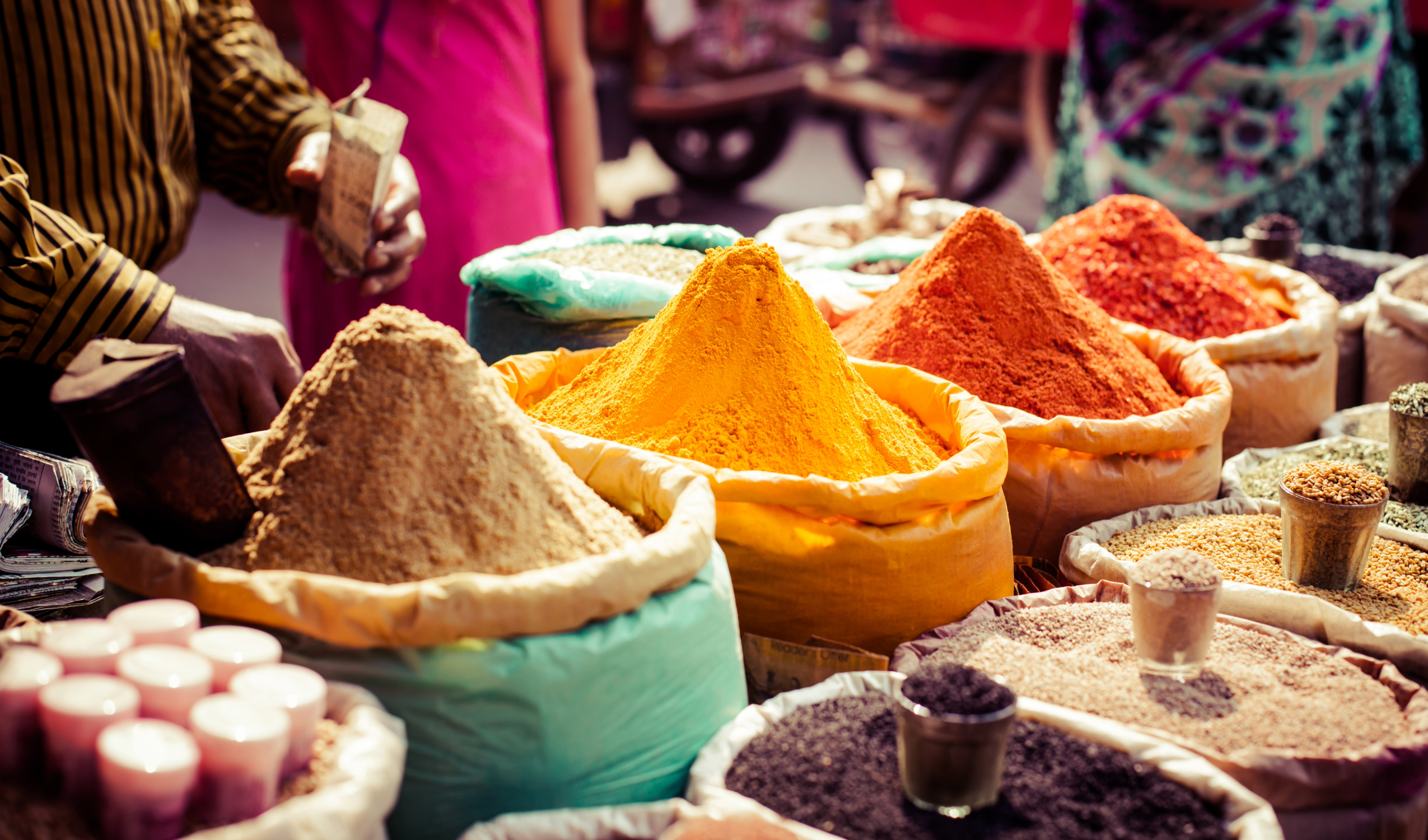
When it comes to dining options, there are many traditional Moroccan restaurants that serve halal cuisine. These restaurants typically feature an array of dishes that showcase the country’s unique blend of Berber, Arab, and French influences. For more casual dining experiences, street food stalls are a great option and offer a variety of dishes, such as kebabs, street-style sandwiches, and fresh juices. For those who prefer to dine in more upscale surroundings, there are also several high-end restaurants in Morocco that serve halal cuisine. These restaurants often feature elegant decor and a more sophisticated dining experience.
With a wide range of halal dining options available, Muslim guests can enjoy traditional Moroccan dishes made with fresh ingredients and cooked according to traditional methods. Whether you’re looking for a casual street food experience or a more upscale dining experience, Morocco’s cuisine has something to offer everyone.
Islam
Islam is the dominant religion in Morocco, with over 99% of the population adhering to its teachings. Morocco is a country steeped in Islamic history and culture, which is evident in the many mosques, madrasas, and minarets that can be found throughout the country. One of the most notable examples of Islamic architecture in Morocco is the Koutoubia Mosque in Marrakech, which is the largest mosque in the city and one of the largest in North Africa.
Moroccan Islam is also characterized by its moderate and tolerant approach to religion. This is reflected in the country’s religious practices, which are a blend of traditional Sunni teachings and the more mystical Sufi tradition. For example, the annual moussem, or religious festival, in Marrakech is a time when locals and tourists alike can witness the colourful and exuberant celebration of Sufi culture.
When it comes to visiting Muslim tourist destinations, Morocco offers a wide range of options for those interested in exploring its rich Islamic heritage. Some of the most popular places to visit include Marrakech, Fes, and Meknes, all of which are known for their well-preserved Islamic architecture and rich cultural heritage. In Marrakech, visitors can explore the Koutoubia Mosque and the Saadian Tombs, which are some of the city’s most notable Islamic landmarks. In Fes, the oldest of Morocco’s imperial cities, tourists can visit the Al Quaraouiyine Mosque, which is one of the oldest universities in the world and an important centre of Islamic learning.
Morocco is a place where visitors can immerse themselves in the traditional culture and history of the Islamic world while enjoying the many modern amenities and comforts of a modern tourist destination. That being so, Muslim travellers embarking on a halal trip to this beautiful destination will feel right at home while also getting to enjoy the different experiences and excitement a holiday in Morocco brings.
Best time to go
Morocco’s climate is diverse, ranging from the temperate coastal areas to the arid deserts, and the Atlas Mountains. With so much to see and do in Morocco, it’s essential to know the best time to visit.
Spring (March to May) is an excellent time to visit halal friendly Morocco, as the weather is mild, and the country is blooming with vibrant colours and fragrances. During this time, the temperature is ideal for outdoor activities, and the country’s famous gardens, such as the Jardin Majorelle in Marrakech, are in full bloom.
Summer (June to August) is another popular time to visit Morocco, as the weather is warm, and the beaches are ideal for swimming, sunbathing, and other water activities. However, it is important to note that summer can be quite hot in some areas, such as Marrakech and the desert, which may make it uncomfortable for some Muslim travellers.
Autumn (September to November) is a great time to visit Morocco, as the weather is still warm, but not as hot as it is during the summer. This season is particularly good for visiting the country’s coastal areas and for exploring the desert, as the temperatures are milder and more pleasant.
Winter (December to February) is the least popular time to visit Morocco, as the weather can be quite cool and sometimes rainy. However, if you’re looking for a more peaceful and relaxed halal holiday, winter can be an excellent time to visit, as the crowds are much smaller, and you’ll have the chance to explore the country’s many cultural and historical sites at a more leisurely pace.
